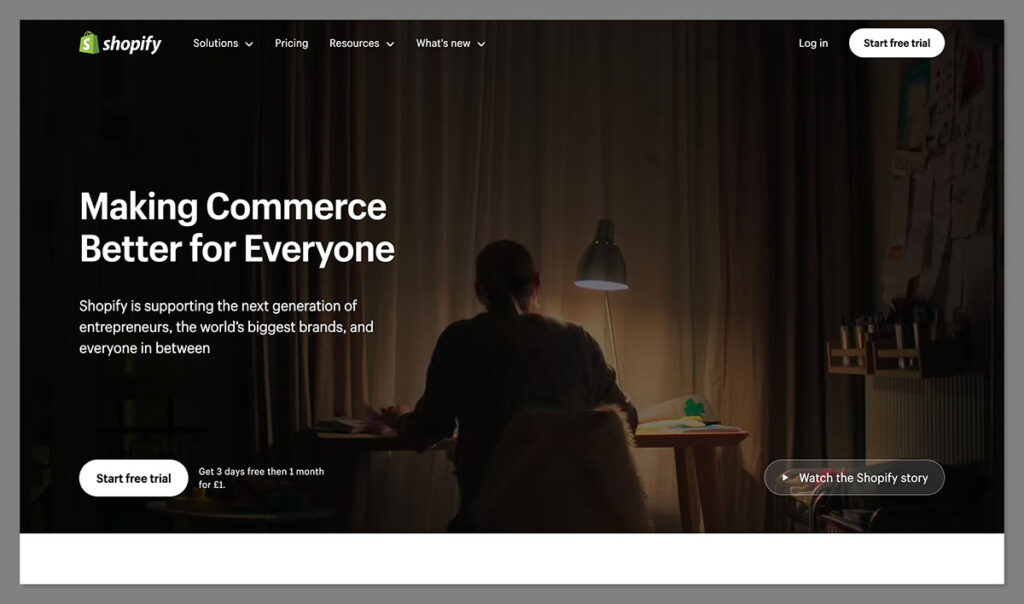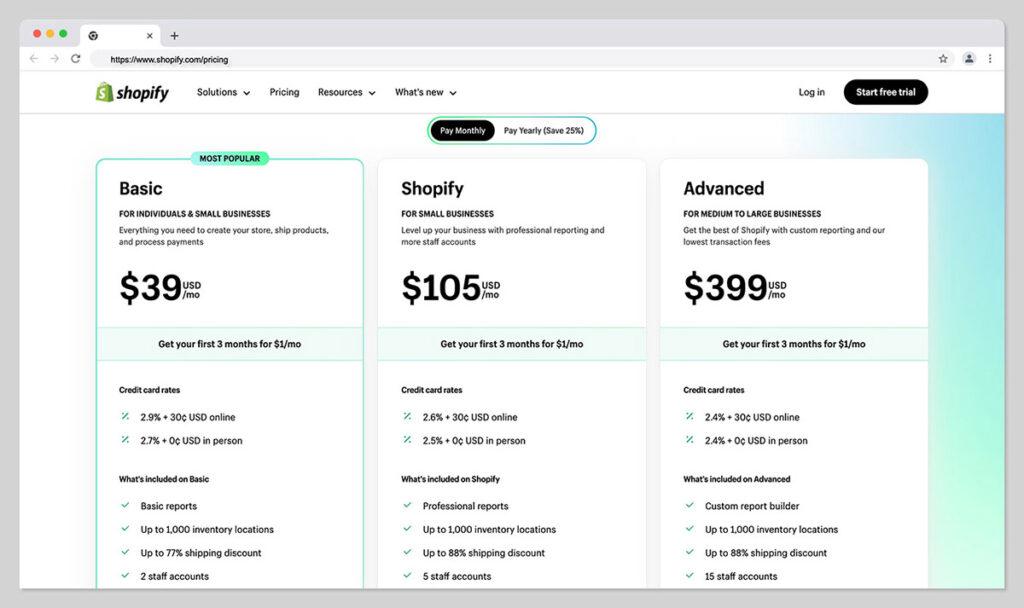If you're exploring e-commerce options, you’ve probably come across both Shopify and Fourthwall. While Shopify is a well established as versatile ecommerce platform, Fourthwall is carving out a niche for creators and influencers who want to engage with fans.
In this guide, we’ll break down the differences, covering features, costs, audience, and more so you can choose the right platform for your goals.
Key Takeaways
- Shopify is ideal for traditional businesses that need robust e-commerce and customization options.
- Fourthwall focuses on creators who want quick monetization and engagement features.
- We’ll dive into key comparisons in terms of pricing, target audience, and unique features.
- Choose based on what fits your needs best, from product management to fan interaction tools.
Shopify Overview
Shopify was founded in 2006 and has become one of the leading e-commerce platforms for businesses of all sizes.

Known for its flexibility, Shopify offers customizable templates, powerful e-commerce tools, and a vast app ecosystem to help users scale their businesses.
It’s popular among online retailers because it supports both digital and physical product sales, as well as complex inventory systems, which make it a preferred choice for small to large businesses.
MORE: Shopify Review
Fourthwall Overview
Fourthwall is a newer player focused on helping creators and influencers monetize their content. Designed for simplicity and ease of use, Fourthwall allows creators to set up an online storefront quickly.
It emphasizes fan engagement and offers tools like supporter messages, subscription options, and merchandise integration.

These features make it ideal for digital creators who want a platform that connects them directly with fans without requiring technical expertise.
Key Features of Shopify
- Storefront Customization: Shopify offers a drag-and-drop editor and a wide selection of themes, allowing users to customize their store’s look and feel with or without coding skills.
- Product Management: Shopify’s product management tools let users easily organize SKUs, track inventory, and handle digital and physical products.
- E-commerce Tools: From advanced shopping cart options to checkout features, Shopify provides extensive e-commerce capabilities. It also supports multiple payment gateways, including PayPal, Stripe, and more.
- App Store: Shopify’s app ecosystem offers add-ons for SEO, marketing, customer support, and analytics, enabling users to expand their store’s functionality.
- Customer Support: Shopify offers 24/7 support through chat, email, and phone, along with a rich knowledge base for troubleshooting and learning.
Key Features of Fourthwall
- Creator-Specific Storefront: Fourthwall makes it easy for creators to set up a fan-centric storefront. It’s designed for users who may lack technical experience, focusing on simplicity.
- Integrated Fan Engagement: Fourthwall’s unique engagement tools include supporter messages and personalized interactions, helping creators foster a closer connection with their audience.
- Monetization Options: Fourthwall supports fan subscriptions, donations, and other monetization features, catering specifically to content creators.
- Merchandise Integration: Creators can offer both physical and digital products, with built-in tools for managing merchandise sales and shipping.
- Support and Resources: Fourthwall provides dedicated support for creators, with easy-to-access resources and help articles.
Ease of Use and Design Flexibility
Shopify’s Ease of Use and Design Capabilities
Shopify’s interface is designed to be user-friendly, though it does require some familiarity to make full use of its advanced options.
Its drag-and-drop builder makes store setup manageable for beginners, while experienced users can customize themes with HTML and CSS.
Shopify provides robust design flexibility, allowing users to choose from hundreds of themes or create their own custom look.
Fourthwall’s Ease of Use and Customization
Fourthwall is tailored to be as simple as possible for creators with limited tech experience. The setup process is streamlined, with ready-to-go templates that look professional out of the box.
While it has fewer customization options than Shopify, Fourthwall’s interface prioritizes ease of use, focusing on helping creators launch quickly and start monetizing their content.
Pricing Comparison
Shopify Pricing Plans

Shopify offers tiered pricing with several plan options:
- Basic Shopify: Ideal for small businesses, with essential features for online selling.
- Shopify: Middle-tier plan for growing businesses, offering additional features.
- Advanced Shopify: Best for larger businesses with more complex needs, offering advanced reporting and lower transaction fees.
- Shopify Plus: A premium, enterprise-grade solution with custom pricing.
Shopify also has a monthly subscription cost for each tier, with optional paid apps and themes that add extra value. Transaction fees are an additional cost unless you use Shopify Payments, which waives the fees.
Fourthwall Pricing Model
Fourthwall uses a revenue-sharing model that typically involves a lower initial cost. This structure is particularly beneficial for creators who want to minimize startup expenses.

Additional fees may apply for advanced merchandising, though Fourthwall’s built-in tools are often enough for many creators. In general, Fourthwall is less costly upfront compared to Shopify, which is beneficial for those prioritizing affordability.
Integrations, Apps, and Add-ons
Shopify Integrations and App Ecosystem
Shopify’s app store is one of the platform’s key strengths. Users can find integrations for everything from social media to SEO, email marketing, and CRM tools.
This ecosystem enables Shopify users to add features tailored to their business needs. Common integrations include apps for analytics, upselling, and customer engagement, which are essential for scaling an e-commerce business.
Fourthwall Integrations and Tools
Fourthwall is designed with creators in mind, offering built-in fan engagement tools rather than relying on third-party integrations.
This approach simplifies the setup, but it also means fewer options compared to Shopify’s extensive app ecosystem.
Fourthwall provides seamless integration with social media platforms and content sites, allowing creators to share and monetize their content more directly.
Target Audience and Best Use Cases
Who Should Use Shopify?
Shopify is a top choice for businesses that need a traditional e-commerce setup. It’s ideal for small to medium-sized retailers, as well as larger enterprises that require advanced inventory management, custom checkout flows, and B2C or B2B models.
Shopify’s vast app store also makes it appealing to businesses with dedicated marketing resources looking to scale efficiently.
Who Should Use Fourthwall?
Fourthwall was designed for content creators, influencers, and artists who want a simple way to engage with fans and monetize their content.
It’s particularly suited for creators selling digital products, subscription services, or merchandise.
Fourthwall offers easy tools for engaging with supporters, making it an excellent option for those focused on fan engagement rather than running a traditional retail business.
Pros and Cons
Shopify Pros and Cons
- Pros: Advanced features, scalable, wide app ecosystem, customizable themes.
- Cons: Higher costs with add-ons, a learning curve for new users.
Fourthwall Pros and Cons
- Pros: Low startup costs, creator-centric features, excellent for fan engagement.
- Cons: Limited app options, fewer customization choices for advanced users.
Comparison Table
| Feature | Shopify | Fourthwall |
|---|---|---|
| Pricing | Tiered, add-ons extra | Revenue share, creator-oriented |
| Customization | Highly customizable | Limited templates |
| Target Audience | Retail businesses | Content creators, influencers |
| Ease of Use | Moderate, learning curve | Simple, creator-focused |
| Integrations | Extensive app store | Limited, creator tools |
FAQs on Shopify vs Fourthwall
What are the key differences between Shopify and Fourthwall?
Shopify is a full-featured e-commerce platform best for retail businesses, while Fourthwall focuses on content creators with fan engagement tools.
Which platform is better for creators?
Fourthwall is generally more suited for creators due to its fan-centric focus and built-in monetization options.
Does Shopify support digital products?
Yes, Shopify supports both digital and physical products, though Fourthwall adds more options for creator-fan interactions.
Can I integrate Shopify with my social media accounts?
Yes, Shopify has many social media integrations, though Fourthwall provides direct engagement tools optimized for content platforms.
Is Shopify or Fourthwall more cost-effective?
Shopify may require more investment in apps, while Fourthwall’s revenue-sharing model may be more affordable for creators.





Comments 0 Responses